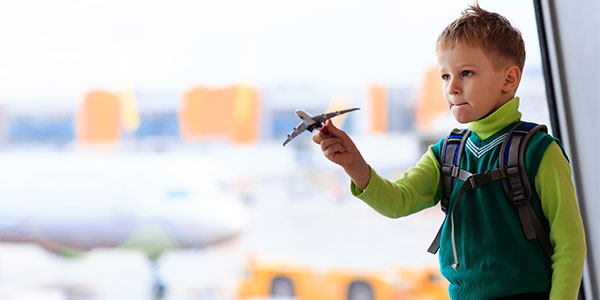Tips for Traveling with Kids
Travel provides enriching learning opportunities for the entire family, even its youngest members. You don’t have to put traveling plans on hold until your children are older.

Manisha Panchal, M.D., pediatrician at the Palo Alto Medical Foundation, answers common questions about traveling with children and offers tips for safe, healthy and happy travels together.
What should I take with me?
A well-stocked, lightweight travel first aid kit is essential for traveling with kids. Include these items:
- Any prescription medications your child uses regularly that might be hard to find or refill overseas (such as inhalers for asthma)
- Over-the-counter pain medications: acetaminophen (Tylenol) and ibuprofen (Advil)
- Oral antihistamine medication (Benadryl)
- Pedialyte powder packets for rehydration
- Polysporin or Neosporin
- 1 percent hydrocortisone cream
- Anti-itch gel or cream
- Antibacterial hand wipes or alcohol-based hand sanitizer containing at least 60 percent alcohol
- Sunscreen
To protect against mosquitoes, pack:
- Lightweight, long-sleeved shirts, long pants and a hat.
- Insect repellant containing up to 10 percent DEET.
- In malaria-risk areas, pack bed nets treated with permethrin, if you are not sleeping in an air-conditioned or well-screened room. You can also buy permethrin or deltamethrin (another insecticide) to treat bed nets and clothes overseas. Be sure to follow the directions to ensure safe use.
What vaccinations does my child need?
First make sure your child’s regular vaccinations are up to date. Then, talk to your pediatrician to learn what other vaccinations your child will need for your destination. Have your child get any necessary vaccinations at least one month before traveling to ensure he or she has built up sufficient immunity.
Common vaccinations required for overseas travel include Hepatitis A and typhoid. If you are traveling to an area where malaria is present, you and the rest of your family will need to take medication to prevent malaria (Mefloquine).
You can find current information on recommended vaccinations for specific countries at the U.S. Centers for Disease Control and Prevention website.
How can I ease my child's discomfort during airplane pressurization?
To avoid ear aches from the change in air pressure during takeoff and landing, give your child something to eat or drink. Swallowing helps clear the ears. Even pretend yawning can ease the pressure.
Can you do anything about jet lag?
There is no safe medication for children to help with jet lag. The best thing you can do is to switch over to the local time as soon as you arrive at your destination. Make sure your children are exposed to sunlight during the day, which helps the bodyadapt to the local time more quickly.
If your child does wake up in the wee hours of the night, stay quiet and don’t start any activities. Keep the environment dark to help him or her get back to sleep. It can take about two weeks to adjust fully to a new time zone.
In addition, don’t skip regular bedtimes and naps just because you’re on vacation. Try to stick to a regular schedule so your children stay rested.
What can my child eat and drink safely in developing nations?
Here’s what I recommend:
- Stick to boiled or bottled water. If that is not available when you are out and about sightseeing, choose a carbonated drink (bacteria cannot survive in carbonated liquids). Avoid tap water, water fountains and ice cubes.
- Make sure any food you eat is fully cooked and don’t be tempted by any delicious smelling goodies from street vendors.
- Avoid dairy products unless you know they have been pasteurized.
- Choose fruit you can peel, like bananas.
- Wash your hands often with soap and water – especially before eating – or use an alcohol-based hand sanitizer. You should also clean your hands after handling money.
Is there anything else I should plan and pack for?
If you will be in a car during the trip, pack your child’s car seat and make sure he or she uses it, and remember to use a seatbelt on every car ride. Pack a helmet if the child will be riding a bike or motorbike, too.
What should I do if I or my child get sick while abroad?
If you are staying with friends or family, ask them for a recommendation for a local doctor.
The U.S. Embassy or Consulate can also provide you with names and addresses of local doctors. To contact the U.S. Embassy or Consulate in the country you are visiting, call Overseas Citizens Services at:
- (888) 407-4747 (calling from the U.S. or Canada)
- (202) 501-4444 (calling from overseas)




